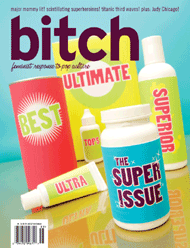Bitch (Issue #35: Super)

Bitch, as depicted on their website, is “a print magazine devoted to incisive commentary on our media-driven world." Reading Bitch was my first experience with a magazine that showcases feminist commentary about the media towards women in an eye-opening, upbeat conversation with the consumer. Issue 35 is considered to be the "Super Issue."
In the "Love It/Shove It" section, a few articles are written in a hardcore feministic opinion about women's role in society depicted via television and advertising. In the article, "This is What a Feminist Should Look Like," the author grapples with blogging and the argument about feminists getting Brazilian bikini waxes and loving high heels as “going along with the patriarchy” and being a crappy feminist. Authors, Samhita M. and Jessica Valenti from Feministing wrote, “Isn’t the whole point that women should be able to decide for ourselves what our appearance means to our feminism-and if it means anything at all?” This speaks volume to the kind of rhetoric that is being displayed in this magazine. It showcases the views of varying feminist sisters who define the term in their own ideological manner.
I found the article "More Than a Woman" to be an excellent composite of women making feminist strides in our society. It started with Aphra Behn (1640-1689), who achieved success as an author of plays, poems and novels: “She is believed to have witnessed a slave rebellion during a stay in Surinam, traveled to the Netherlands as a spy for King Charles II, and wound up in debtor’s prison all before she turned 30.” It concluded with Lois Weber, an auteur of early Hollywood. According to the article, “Weber was one of Hollywood’s highest-paid directors, heading Universal Studio's production department and pioneering technical innovations such as split screens and camera angles.” This section alone is reason enough to pick up the magazine to find out our history and add it to our repertoire of women making history in America.
Overall the magazine was stimulating, and is an excellent precursor to women-orientated discussions on how we are depicted in popular culture. The articles provide an opinionated, in-depth backdrop to those conversations.
"hardcore feministic"??I am not sure whether this term is even grammatically correct, and I am that much more confused about what is the relevance of calling explicitly feminist content "hardcore". Is "hardcore" supposed to be a negative descriptor? If so, what would be positive? "Softcore"?-LV